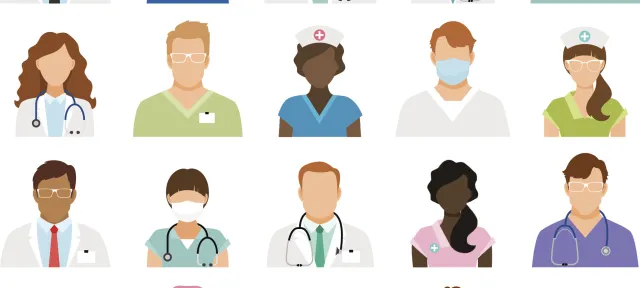When you think of the healthcare industry, you may initially think of doctors and nurses serving at the forefront of patient care. While both play a vital role in the healthcare industry, many other careers are needed to help keep the healthcare industry running. Professionals in these careers may work one-on-one with patients or they could work behind the scenes. Take this quiz to find out which allied health career could be a good fit for you!
What types of healthcare degrees are there?
Herzing offers multiple allied health degrees, including:
- Dental Assistant and Dental Hygienist: These professionals work one-on-one with patients to provide quality patient care. While both play an important role in a dental office, the two careers are different.
- Healthcare Administration: It takes a lot of work to run a healthcare organization and this field focuses on meeting the operational needs of a facility. Healthcare managers are typically experienced high-level managers, directors and executives who focus on the big picture and overall needs of an organization or department, while healthcare administration can start as an entry-level position that focuses on day-to-day administrative duties. You can qualify for many different types of jobs at the associate, bachelor's, or master's degree levels. Some healthcare administrators advance to higher-level positions and/or become healthcare managers, but here are some of the key differences between these careers.
- Medical Billing and Coding: Translating medical services into medical codes helps healthcare organizations effectively file insurance claims and record patient treatments. Although there is some overlap, medical billing and medical coding are not the same things.
- Medical Assisting and Medical Office Administration: Both professions ensure that a healthcare organization runs smoothly so that providers can focus on patient care. However, the key defining difference is that medical assistants play a more direct role in patient care whereas medical office assistants play a much greater administrative role.
- Radiologic Technology: Radiologic technologists (or radiographers) operate X-ray and other medical imaging equipment. They work closely with other members of an organization’s healthcare staff.
- Sterile Processing: Sterile processing techs ensure medical instruments are properly inspected, cleaned, and sterilized for use across a hospital, clinic, physician’s office or other healthcare institution. Sterile processing techs do not work directly with patients, but their work is imperative to ensure every patient achieves positive health outcomes.
- Surgical Technology: Surgical technologists work closely with other members of a surgical team to assist before and during a surgical operation. This could include preparing the operating room, maintaining the sterile field, passing instruments and many other related tasks.
- Physical Therapist Assistant (PTA) and Occupational Therapy Assistant (OTA): Both play a hands-on role by helping a patient regain mastery of physical movements, but OTAs and PTAs have different purposes, patients and functions within the healthcare system.
Where can I work in healthcare?
Work locations will vary by specialization, work experience and demand. Many healthcare workers will work in hospitals, clinics and doctors’ offices. Professionals like surgical technologists will often work in hospitals, but they also sometimes work in dental offices. PTAs typically work in clinics, but sometimes they are required to work in nursing homes or even travel to patients’ homes. If you know you’d like to work in a specific environment, be sure to do plenty of research to see what opportunities are available before beginning a degree program.
How long does it take to start my career?
The amount of time it takes to get a degree in healthcare depends on your program, previous education and your career path. Some healthcare careers can be completed in two years or less and can offer stable employment without requiring you to earn a four-year degree. However, many programs offer a pathway to a higher degree and potential career advancement. Herzing University offers scholarships for healthcare students as well the option to transfer credits for some programs.
Is it worth completing a degree in healthcare?
The short answer is yes!
Healthcare is a growing industry and there are a variety of careers to choose from. Some of this growth can be attributed to aging baby boomers, who will need medical care and health services. Additionally, many from that same generation will retire soon, creating more job openings in healthcare-related positions, including medical assisting, occupational therapy and physical therapy assisting.
Additionally, healthcare organizations are evolving and increasing their use of technology to create operational efficiencies, innovate and advance medical practices and improve their quality of care. For example, many organizations are streamlining their billing processes and creating electronic patient records. As a result, there is a growing demand for medical billing and medical coding professionals to create and interpret these electronic records, as well as professionals in management and administration to oversee the process. There has also been a greater push for telehealth as a means of offering patient care.
If you are interested in a healthcare career, there are many opportunities for you to get started and grow in the field. Many healthcare degrees can lead to very satisfying careers, such as dental hygienists, which ranked #2 in Best Healthcare Support Jobs in 2023 by U.S. News and World Report.
We can help you choose a healthcare degree.
No matter which program you choose, a healthcare degree could help you unlock valuable opportunities and a rewarding career in the industry. With a degree in healthcare, you will have the ability to play a valuable role in defining and supporting the healthcare industry.
Do you want to explore your quiz results more? Consider meeting with one of Herzing’s admissions advisors or our career development team for more guidance.
Here are some additional resources to help you determine what healthcare degree could be right for you:
- One graduate offers three questions to help you choose your healthcare degree.
- Another student focused on experience, employment outlook and career options to select her degree.
- If you are not thrilled by the thought of clinical rotations or significant hands-on patient care, explore six healthcare careers that don’t require clinical rotations.
- Have you ever wondered what your day-to-day routine could look like? A few students share what a day is like in their careers:
Classes Start July 8th
Learn More Today
Learn More About Our Healthcare Programs
* Bureau of Labor Statistics (BLS), U.S. Department of Labor, Occupational Employment and Wage Statistics 2023 / Occupational Outlook Handbook 2022. BLS estimates do not represent entry-level wages and/or salaries. Multiple factors, including prior experience, age, geography market in which you want to work and degree field, will affect career outcomes and earnings. Herzing neither represents that its graduates will earn the average salaries calculated by BLS for a particular job nor guarantees that graduation from its program will result in a job, promotion, salary increase or other career growth.





